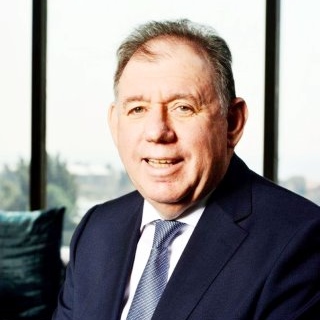click to dowload our latest edition
CLICK HERE TO SUBSCRIBE TO OUR NEWSLETTER


Published
6 years agoon
By
adminJORDAN MOSHE
However, he says, if we – both South Africa and its Jewish community – assume the big role we are capable of filling, there may be hope yet.
Koseff, who is due to step down from his position at Investec in October this year, shared not only economic insights, but also outlined his own journey in the world of finance.
“This past Sunday marked my 38-year milestone of working at Investec,” he says. “When I became part of a bank which would one day become known as Investec, it had R1 million in capital to its name, and made R280 000. Today, it has over R3.6 trillion in assets, wealth management and its banking division altogether, and makes almost R10 billion. What a journey it has been.”
Hailing from Benoni, Koseff joined the company in 1980, only six years after it was founded as a small leasing and financing company by Larry Nestadt, Errol Grolman and Ian Kantor.
Having initially worked at Schwartz & Fine (which later became Arthur Andersen Inc), he qualified as a chartered accountant in 1975. From 1976 to 1980, Koseff worked as a professional assistant at Alex Baillie Koseff & Wheeler, and then joined Investec.
“After Kantor left in 1984, the three of us who were left always had the liveliest arguments,” laughs Koseff. “We had our opinions, like any good Jews. No matter where we found ourselves, we would engage in these vibrant discussions. I remember a meeting we attended – the three of us not only wore denim, but we fought and even threw chocolates at each other.
“But we did share a good relationship, no matter how shocked those people at that meeting may have been. Together, we bought a bank in London from Barclays, and others in Mauritius, Australia and Israel from the Rothschilds. When I look back and think of Benoni, I am always stunned by where we came from and what we are today.”
Koseff acknowledges that the economic reality we face is by no means encouraging. “I’ve lived through five economic crises,” he says, “and though I doubt I’ll see another one in my lifetime, we face big financial challenges almost daily. Eskom appealed for funds in February, and the banks were relied on to help. The government and the banks are intertwined – one can get the other into trouble so easily. If Eskom had defaulted, South Africa would have plummeted the way it did just after the Rubicon speech in 1985.
“We would have ended up going to the International Monetary Fund for money, and that is a terrifying thought.”
The extent to which South Africa has suffered from financial corruption is incalculable, he says. “At a BRICS event I recently attended [BRICS being the group of five emerging economies: Brazil, Russia, India, China and South Africa], a minister said to me that we will never understand the extent of the damages the Zupta relationship caused this country. Our international profile was shocking. I dreaded [then president Jacob] Zuma attending the G20 summit, fearful of what he would say. He walked off stage when a question was too challenging for him.
“The confidence in our country suffered tremendously, and our ratings around the world plummeted.
“While we have improved, we still feel its effects, and some of those involved in that unhealthy relationship are still in the government. If President Cyril Ramaphosa had not replaced Zuma, I don’t want to consider where we would be now.”
On this note, Koseff is fairly confident in South Africa’s future. “If we can stabilise our financial policies and improve our growth rate, we can achieve so much,” he says. “Our current rate is between 1.5 and 1.8. It should be 5%. Without this, we have no momentum. We are like the Investec zebra with a thorn in its foot: we can shuffle along, but we can’t run.
He continues: “Under Ramaphosa, the country can attract foreign investment and regain the confidence of investors. In many ways, he is like Madiba – he engages in dialogue and gives thought to process. For too long, the presidency just made decisions without thought. That’s a dictatorship.
“Yes, we have our problems: land redistribution, the proposed health insurance scheme, Eskom. All these need to be addressed. But rather than attacking the financial institutions, the government must see that Treasury and the banks are supporting pillars of the country and can help resolve these issues.
“Calling ourselves a developing country retards our growth. We are capable of development and need to move beyond our current reality. Education is in tatters, state bureaucracy is a problem, but there is hope. We are in the midst of a tough season, but that doesn’t mean the field is dead and offers no opportunity. Our banks are stable, and we have what to offer the world.”
According to him, the key is an emphasis not on statistics, but on people. “When it comes to finance, the key is to believe in people,” he says. “People are as important as the data. Companies today punt that data is everything, but people are at the centre, and their roles and needs must be recognised. We don’t live off society, but we live in it. It isn’t about the money or maximising profits. If society doesn’t work, it won’t be long until you don’t.”
Koseff concluded: “As Jews, we are feeling threatened here by anti-Semitism and wonder where we are headed. But we can work our way through it and have such a big role to play here. Society won’t acknowledge our contribution publicly, but be this as it may, they are aware of it, and we need to continue making a difference.
“We have so much to give our society and are capable of playing a tremendous role in moving South Africa forward.”
